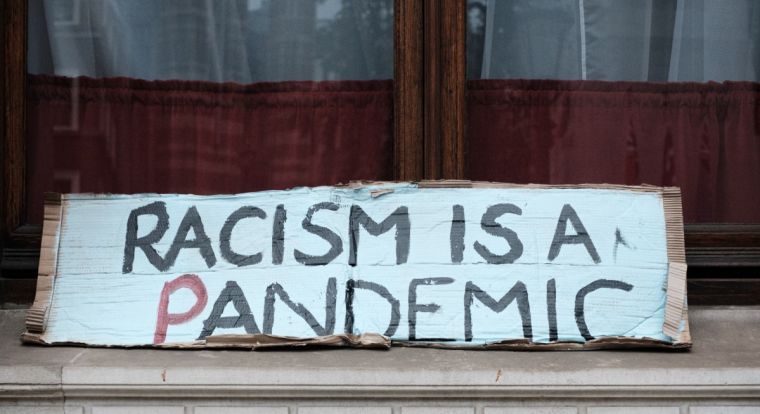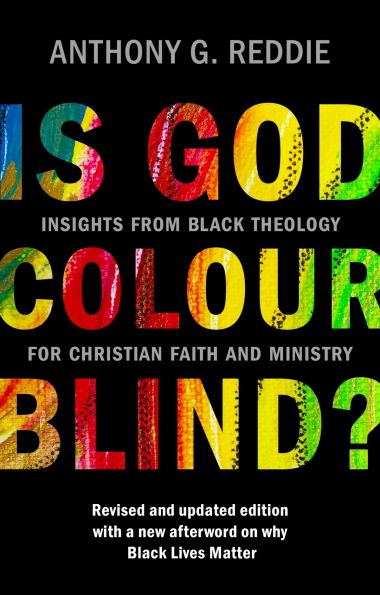Why it has taken so long for black lives to matter

During the years since my book, 'Is God Colour Blind?', was first published, I have been struck by how little has changed. As I write this, I am reflecting on the resurgence of the Black Lives Matter movement. In writing this piece against the backdrop of the upsurge in direct action led mostly by young people across the world, and as I reflect on why, to so many people, Black lives do not matter, I am forced to look at my own life.
The writer of this book is an African Caribbean male, who is now in his mid-fifties, but was in his mid- forties when this work began. I was born in Bradford, West Yorkshire, to Jamaican parents who came to this country from the Caribbean in the late 1950s. As such, I am a second-generation Black African Caribbean British subject. I was born into and nurtured within the Christian faith from the Wesleyan Methodist tradition. I ply my trade as a Black liberation theologian and decolonial educator working within Oxford University, but have been domiciled in Birmingham since 1987.
Growing up in Bradford in the 1970s and 1980s occurred against a backdrop of racism and economic deprivation. Our family lived in one of the poorest areas of the city, in a clean, tidy and respectable home, which nonetheless came with no central heating and had an outdoor toilet or 'privy' as it was called. The evangelical Methodist church in which I was nurtured in the faith was supportive, but nothing they said or did in that church spoke to the social location and experience of being a first-generation Black British-born person. The truth was, they did not need to say anything, because the normative Whiteness of the Church blinded them to the realities of racism within the church and the wider city.
To be clear, the members of my church were kind and gracious people, but they had nothing to say to the persistent reality of racism that affected the lives of all non-White people in the city of Bradford. I would argue, the consistent and persistent challenge that has faced Black Christians in Britain has been one of trying to get White Christianity to give expression to an anti-racist articulation of the gospel. In using the term 'White Christianity', I am talking about people of European extraction and descent, who form the majority of the population, who believe in the God revealed in Jesus Christ and give expression to the central tenets of the Christian faith in myriad forms of social-cultural practices.

White Christianity was oblivious to our realities and social existence. Worse than that, this church and many others were complicit in the racism we experienced as disenfranchised Black bodies living in Britain. I remember, in the late 1970s, a march by White Christians seeking to 'win back the city for Christ'. I remember many of the leaders in the church I went to speaking excitedly about the need to participate in this event. The growing influx of Muslims from the Indian subcontinent was the catalyst for the march.
Despite the evangelical zeal of my mother, the spiritual anchor of the Reddie family, she knew better than to advocate that our Christian family take part in a march that owed more to a desire to shore up White privilege than it did to restating the supremacy of Jesus Christ as the Lord of the city. Instinctively, we all knew that, although we were card-carrying members of the church, this march was not for us!
This afterword seeks to remind us that the Black Lives Matter movement has had a long period of gestation, and from long before the death of George Floyd there has existed a history of ideas and practices that have rendered Black lives of limited importance – indeed, often of no importance at all.
I offer these reflections for three reasons. First, we need to remind ourselves that systemic racism predates George Floyd's death by a long way. Second, as heinous as George Floyd's death was, we need to recognize that most Black people do not experience the same extreme level of police violence. Rather, what we face is a litany of often covert forms of racism that are not as visible and dramatic as what happened on that day. The racism that many of us experience is systemic in nature, often hidden in 'plain sight', which the COVID-19 pandemic has revealed as being more than just our paranoia or having 'chips on our shoulders'. Third, we need to understand that the disregard directed at Black bodies is based on centuries of toxic theological ideas, which means that a radical, liberatory Christian response must be something more than simply quoting biblical texts, such as Galatians 3.28 or Revelation 7.9.
The existence of racism in the UK today, and in many parts of the so-called developed West, is testament to the continuance of an underlying Eurocentric, Judaeo-Christian framework that has invariably caricatured Africans as 'less than' and 'the other'. The notion that human beings can be categorized by a fixed set of identities that determine their human potential and capability, often expressed in terms of morality and ethics, can be traced back to the first four centuries of the Common Era (CE). It was during this epoch that negative connotations pertaining to Black people as the 'other' began to surface in Christian thinking.
The scourge of racism in the UK is thus nothing new for Black people. Whatever COVID-19 has revealed in terms of social and economic disparities between Black and White, these have their roots in history. As Robert Beckford has demonstrated, one can chart a genealogy of racism in European intellectual thought that has exerted a disproportionately negative hold on the life experiences of Black people.
Scholars, such as Eze, have shown the extent to which the allegedly enlightened thinking of such philosophers as Hume and Kant was infected by White supremacist thought. The construction of the binary of Blackness (as bestial and 'less than') and Whiteness (as the personification of goodness and opposite of Blackness) is a product of modernity. The chief legacy of transatlantic slavery was the unleashing of the rampageous and ravenous animal that is racism. The construction of racialized notions of Black inferiority and restricted perspectives on Black humanity was the dangerous offspring of the chattel slavery of the 'Black' Atlantic.
The outworking of an unchanging and hierarchical manipulation of humanity did not disappear when the Act to abolish the British slave trade was passed in 1807. The Act brought the making of slaves to an end but racism, the notion of White supremacist norms, most certainly did not end.
And so today, having witnessed at first hand the White flight from innercity churches in the UK, along with the anti-immigration rhetoric of those in favour of Brexit, we need to remember that the antipathy expressed by many ordinary, seemingly respectable White people to the presence of Black bodies has had a long incubation period.
From Is God Colour Blind? Insights from Black Theology for Christian Faith and Ministry, by Anthony G Reddie, out now from SPCK Publishing.
Anthony G Reddie is Director of the Oxford Centre for Religion and Culture, Regent's Park College, University of Oxford. He is also an Extraordinary Professor of Theological Ethics at the University of South Africa. He is the author of Theologizing Brexit: A liberationist and postcolonial critique (Routledge, 2019) and Is God Colour Blind? Insights from Black Theology for Christian Faith and Ministry (SPCK Publishing, 2020)
Views and opinions published in Christian Today are those of the authors and do not necessarily reflect the views of the website.











